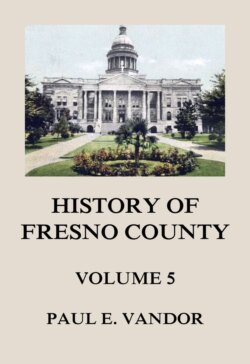Читать книгу History of Fresno County, Vol. 5 - Paul E. Vandor - Страница 26
На сайте Литреса книга снята с продажи.
WILLIAM DUNCAN.
ОглавлениеA business man of stability and influence, most interesting to converse with — perhaps because of the many hardships through which he has gone — is William Duncan, who has built up a substantial block in the commercial district of Clovis and now enjoys, with his gifted wife and daughter, the fruits of his years of toil. His grandfather, Thomas, was born in Scotland; he was a college graduate and an educator; he crossed the ocean and settled in New York, afterwards teaching in Montreal, where he was principal of schools. His father, William, was born at Utica, and growing up to be a farmer, he crossed the border and settled in Ontario. In 1866, he came to Lanark, Ill., and later removed to Albany, Whiteside County, the same state, where he resided until he died. Mrs. Duncan had been Elizabeth Burton Williscraft before her marriage; she was born in England, and died in Clinton, Iowa. She was the mother of eight children, five of whom are still living.
Born at Smith's Falls, Ontario, on June 13, 1857, the second youngest, William was educated at the public schools, completing the grammar grades in Albany, Ill. When sixteen, he began running on a Mississippi river boat owned by his brother-in-law, Captain O. P. McMahon, where he became engineer; but quitting the river, he chose the blacksmith trade. At Clinton, Iowa, he had a chance to learn the trade with George Bryant, and he remained with him for three years, or until 1877. He was also awhile in business for himself. When he sold out, he joined a company of young men going to the Black Hills, who made their way through the Indian country to Fort Pierre by means of ox teams. There he prospected and mined, with varying luck. He and a partner, John F. Straub, located two mines. On leaving, they let a fellow in as partner with a one-third interest. He developed the veins but the next year all the records of the location of mineral claims were burned in the big fire at Deadwood; and taking advantage of this fact, the rascal jumped both claims and sold them for one hundred thousand dollars, and neither Duncan nor Straub ever received anything for their share.
Meanwhile, Mr. Duncan had made his way from Deadwood to Morrison, Colo., where he worked at his trade, and later to Leadville, where he prospected and mined. Then he came on to Prescott, Ariz., where he was a blacksmith with Fred Britt. He next engaged in cattle-raising with J. H. Hicks, in the Magolone mountains, using the brand of H-D, the two letters representing the two partners. Hicks and Duncan. After some years, they divided up, and he continued the cattle business alone in Strawberry Valley. He had been in the cattle business for sixteen years, and had prospered, owning many cattle, when a three years' drought came on, and he lost all that he had.
While in Strawberry Valley, Ariz., Mr. Duncan was married to Miss Laura Bell McFarlane, who was born in Merced County, Cal. She was well-educated and a member of the teaching profession; and was engaged in teaching when she met Mr. Duncan. Her folks lived in the San Joaquin Valley; and after they lost all their cattle, they moved to California in 1895. Here Mr. Duncan engaged in mining in the Yosemite Valley, on the Mariposa-Tuolumne county line; and with his brother-in-law he opened and ran the Laurel-LeGrand mine. There they built a five-stamp mill and put in a hoist and other machinery, using steam power for all the work. Bent on greater adventure, Mr. Duncan, in 1898, made the journey into the Klondyke, going to Atlan Lake, then to Dawson, then to Eagle City, traveling 1,500 miles over ice with dog teams, to Nome, prospecting from point to point. He was two years and four months in the frozen North, and during that stay, all too long, went through many hardships, so that he was never before so glad to return to California.
Taking up his residence here again, he located in Clovis, and ran a butcher shop. Then he worked in San Francisco and Portland, and finally at Coalinga, where he was on the construction of the water-line. In November, 1908, he bought out Broes Giffin's blacksmith shop, and continued the business. All he had was a little wooden shop on two lots; since then he bought three lots adjoining, giving him 125 x 150 feet located on the corner, and built a new blacksmith shop, 50 x 75 feet. He also built a new brick garage, 50 x 120 feet, and furnished it with modern machinery. This garage and equipment he rents. He also owns a comfortable residence.
Mr. and Mrs. Duncan have had five children: Maud L., a graduate of the Fresno State Normal, and now Mrs. Brown; Grace B., also a graduate of the Fresno State Normal, teaching in Oakland; William J., a graduate of Clovis High School, who died at the age of eighteen; George, who died at one year of age; and Oliver J., attending the Clovis High School. Public-spirited, and favoring all that makes for better conditions, Mr. Duncan is a Republican in national politics, but supports the best man when it comes to local issues. Both Mr. and Mrs. Duncan enjoy the respect and good-will of the community.
